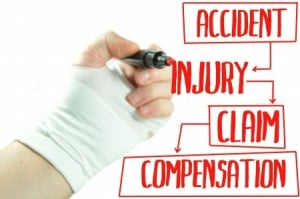
Photo Credit: 123RF Stock Photo[/caption] While some auto accidents and other personal injury accidents are caused by one person’s negligence, in some cases, more than one party may have been negligent. In fact, in some situations, the victim of an accident may have, in some small way, been partially responsible for the accident as well. For instance, if a driver runs a red light and hits a motorist who was talking on his or her cell phone, both motorists may be deemed partially responsible for the accident. Many people mistakenly assume if they were partially responsible for an accident, they are barred from pursing a personal injury lawsuit or obtaining financial recovery. But this is not the case. When more than one party is responsible for an auto accident, issues of comparative negligence or contributory negligence will come into play. Most states, including Illinois, apply a modified comparative negligence standard whereby an injured party can still recover money damages even if he or she is partially responsible for the accident, but the amount of money damages is reduced by the portion to which he or she was responsible. For instance, if a motorist was 20% at fault for an auto accident, he or she may be able to recover up to 80% of his or her damages. Only a small number of states apply a contributory negligence standard and prohibit recovery if an injured party was responsible in any way whatsoever. As with any personal injury lawsuit, issues of liability – including partial liability – will require proving the following:
- The defendant owed the plaintiff a duty of care;
- The defendant breached his or her duty of care;
- The plaintiff suffered injuries; and
- The breach of the defendant’s duty of care was the proximate cause of the plaintiff’s injuries.
However, in the case of comparative negligence, the role of defendant and plaintiff will be reversed, and the defendant will need to prove that the plaintiff breached his or her duty of care. Personal injury claims – regardless of whether one or more parties may be liable – must be filed within the applicable statute of limitations or the parties will forfeit their right to pursue a personal injury claim. Because issues of partial liability involve complex legal and factual assessments, it is also important to consult with a personal injury attorney as soon as possible. The Chicago personal injury lawyers at Steinberg, Goodman & Kalish focus on representing accident and injury victims, including those who were injured as a result of negligence. Contact our office at (312) 445-9084 to schedule a free consultation to learn more about your legal rights and what type of evidence would be necessary to prove liability. Steinberg Goodman & Kalish (www.sgklawyers.com) is dedicated to protecting victims and their families. We handle medical malpractice, product liability, personal injury, wrongful death, auto accidents, professional negligence, birth trauma, and railroad law matters. Contact us at (888) 325-7299 or (312) 445-9084.

